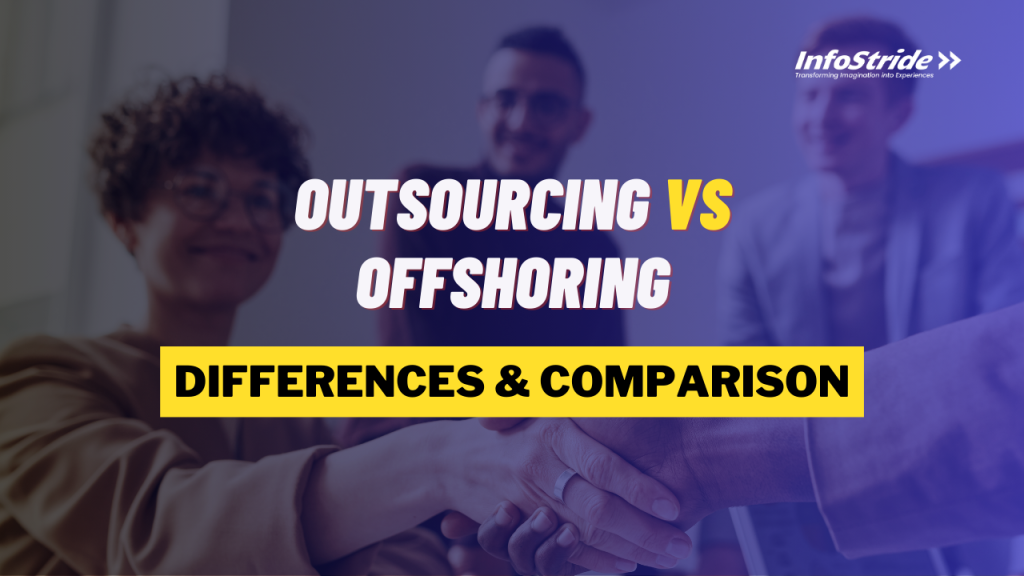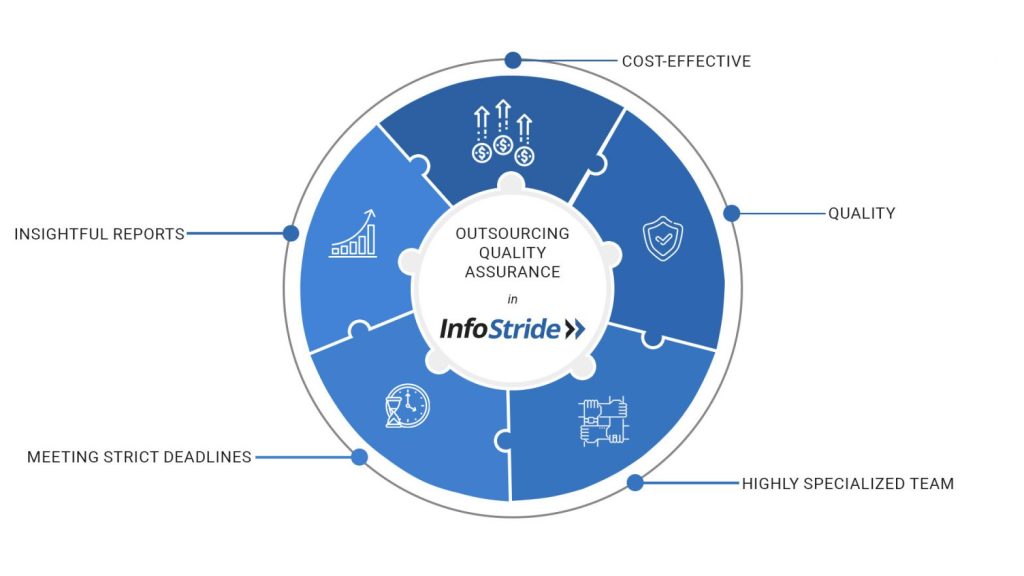Table of Content
Outsourcing and offshoring have been common practices for companies across industries to run their businesses for decades. Studies reveal that around 300,000 jobs are outsourced annually in the U.S.
What’s more? The business landscape has witnessed numerous success stories of startups and the world’s tech giants that have outsourced to leverage the benefits it brings to the table.
As business philosopher Peter Drucker stated, “Do what you do best and outsource the rest.” and this is embraced by some of the tech’s biggest companies such as Google, WhatsApp and Slack.
Though outsourcing and offshoring are often used interchangeably, these two terms have different meanings with their own set of advantages and limitations.
This post aims to help you clear the confusion between outsourcing and offshoring so that you can figure out which one is the most effective business tool to optimize your business processes.
A Quick Comparison: Outsourcing vs Offshoring
Let’s first have a quick overview of outsourcing vs offshoring.
| Outsourcing | Offshoring | |
| Definition | Company entrusts certain business processes to a third-party vendor. | Company relocates certain business processes to a different country. |
| Location | Within or outside the country | Outside the country |
| Primary Purpose | Focus on core business activities and operations | Lower Labor Costs |
| Work Performed By | Employees of the outsourcing service provider | Employees of the company |
| Benefits |
|
|
| Risks and Criticism |
|
|
| When It is Ideal | You need certain services for a short period of time or occasionally | You need complete control over the workforce and operations |
A Detailed Comparison: Outsourcing vs Offshoring
To decide whether outsourcing or offshoring is the right for your company, it’s imperative to dig deeper into the benefits and risks of both business practices.
Let’s first begin with outsourcing.
What is Outsourcing?
Outsourcing is a practice whereby a company delegates certain business activities, processes or tasks to a third-party service provider. Typically, most outsourced processes are non-core or peripheral tasks of the company.
Outsourcing is not limited to contracting work out to an external organization located in the same country but a different country is also allowed. When foreign contracting happens, this is also called offshore outsourcing.
The global IT outsourcing market was worth $318.5 billion in 2020 and it is anticipated to hit $425.9 billion by 2026, at a CAGR of 4.5%. The most common business tasks that companies outsource include IT services, human resources, payroll, development, staffing, finances and accounting.
Main Advantages of Outsourcing
Outsourcing is a tested and proven strategy to enhance business operations. Irrespective of the size, companies outsource to reap the invaluable benefits of this business practice; which include:
1. Reduced Costs:
In Deloitte’s 2020 Global Outsourcing Survey, the primary reason for companies to outsource is cost reduction. Companies often outsource to avail cheaper services and still get high-quality. Hiring in-house experts bring many additional expenses to the table such as training, infrastructure and technology.
On the other hand, outsourcing empowers companies to pay only for the service when needed instead of hiring employees full-time.
Also Read: Should You Hire an In-House Developer or Outsource Overseas?
2. Focus on Core Business Operations:
By outsourcing tasks and activities that are not core to the company such as human resources, sales, payroll, marketing, staffing, mobile development and accounting among others, you can better focus on core competencies that bring you a competitive advantage.
3. Access to Expertise:
There are always certain activities and tasks in which companies don’t have in-house expertise. In these situations, the best course of action is to outsource to the specialist service provider.
That way, companies can leverage subject matter experts, resulting in higher quality services or products by outsourcing partners.
For example, if your company needs a mobile app for its business, outsourcing mobile app development to an IT outsourcing company leads to top-notch development in a timely manner.
4. Scalability with Ease:
With outsourcing, scaling up or down the outsourced team as needed is no hassle.
For example, if you have employed an outsourced team of three remote Kotlin developers for your software development needs but you need more developers, then the outsourcing partner can easily scale up your team.
What is Offshoring?
Offshoring is a practice whereby a company shifts business tasks or processes to its center located in a different country. As mentioned before, it is primarily done to gain access to a lower cost labor market.
A company may leverage the business practice of offshoring through an outsourcing arrangement with an external organization located in a foreign country or by setting up its own development center in the offshore location.
Main Advantages of Offshoring
Let’s now have a look at what benefits offshoring brings to the business.
1. Lower Labor Rates:
One of the primary reasons a company offshore their business tasks or operations is to save on labor costs. By opening a center overseas or partnering with an offshore service provider, companies can gain access to labor at rates considerably much cheaper than their own countries.
As per the Global Services Location Index (GSLI) of 2019, India is the top offshoring destination for companies around the world due to low labor rates.
Below is a quick overview of the average software developer salary by country:
| Location | Cost |
| India | $18-$40 per hour |
| Russia | $25-$45 per hour |
| South America | $30-$50 per hour |
| Australia | $60-$95 per hour |
| North America | $100-$150 per hour |
Thus, no wonder that building an in-house development team for a US company is much costlier than joining hands with an offshore software development service provider.
2. Cost Savings:
In addition to lower labor rates, there are other cost-savings benefits associated with offshoring – especially for US-based companies.
Companies can save from lower costs in health insurance, Medicare taxes, workers compensation, Social Security benefits and other costs linked with employees in the US.
Moreover, the expenses of infrastructure, technology and utilities are also comparatively much lower in developing nations like India.
3. Business-Friendly Regulations:
There are some offshoring destinations that are known as business-friendly countries due to stress-free paperwork and complete establishment within 1-2 days.
This factor is imperative for entrepreneurs who want to start a business or companies interested in global business expansion. Singapore is categorized as the second easiest country to do business worldwide as per the World Bank ease of doing a business index.
In fact, Singapore is known as a top destination for startups to do business, with most of the paperwork digitalized and done in a matter of hours. With a strategic IT startup solutions partner, startups can expedite their journey to become the next unicorn.
4. Access to Skilled Workforce:
Another benefit that companies reap from offshoring is to gain access to a greater pool of skilled talent. For example, India is known for having a vast pool of talented IT professionals with excellent command over English proficiency.
That’s why many companies have collaborated with offshore software development companies or established their own offshore development centers in India.
Also Read: Guide to Build Offshore Development Teams
Risks and Criticisms of Outsourcing and Offshoring
Both outsourcing and offshoring are subject to risks and criticism.
Some of the common risks associated with outsourcing include the incompetent workforce of a service provider, utilization of obsolete technologies, high dependency on the external service provider and misaligned goals.
When outsourcing to a different country, companies could also experience risks like communication gaps, time zone and cultural differences.
For offshoring, the common risks include project failure due to lack of communication, poor IT infrastructure, economic changes, changes in government policies (IT policy) and others.
Also, offshoring and outsourcing overseas are criticized for stealing jobs.
How InfoStride Can Help You?
Being one of the full-fledged technology and business solutions providers, InfoStride has been catering to worldwide clients with technology and business offshore outsourcing services.
Our offerings are not just limited to end-to-end software development but include everything under one roof such as staffing, HR, payroll, EOR, PEO and dedicated resources to help you always stay ahead of the competition.
We have various flexible engagement models in place to empower companies and businesses to collaborate with us in the way that best suits them.
- Outsourcing Development: Outsource end-to-end product development to us and get your project handled by our team.
- Build Dedicated Team or Hire Remote Developers: We can help you build a full-stack dedicated remote development team around the tech stack required for your project. Or we can deploy a dedicated remote resource(s) who will work full-time on your projects with administrative, infrastructure and payroll support.
- BOT (Build-Operate-Transfer) Model: We will help you build your offshore team to a fully operational level and then legally transfer your workforce, intellectual property, workforce, knowledge base, and assets to you when you’re ready.
To get started or learn more about our cooperation models, schedule your free consultation session with one of our experts today.
The Bottom Line
We hope that our post has helped you clear the confusion between outsourcing and offshoring.
Both business practices have one set of perks and risks. Outsourcing seems to be an ideal solution when you don’t want to get distracted by non-core business tasks. On the other hand, offshoring empowers you to access a low labour market.











